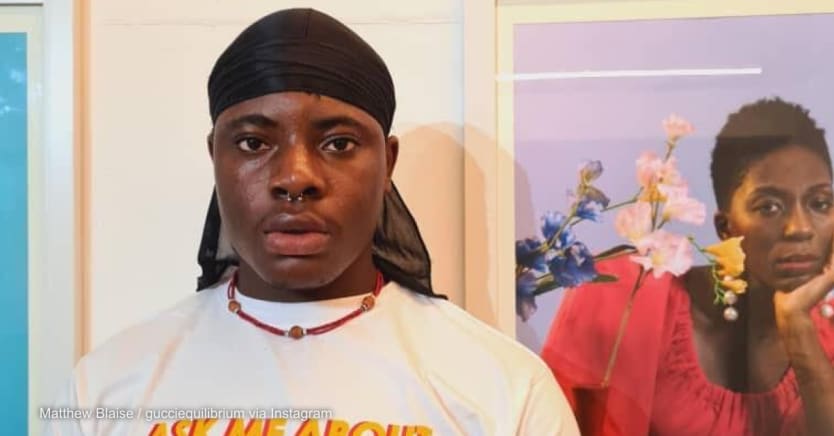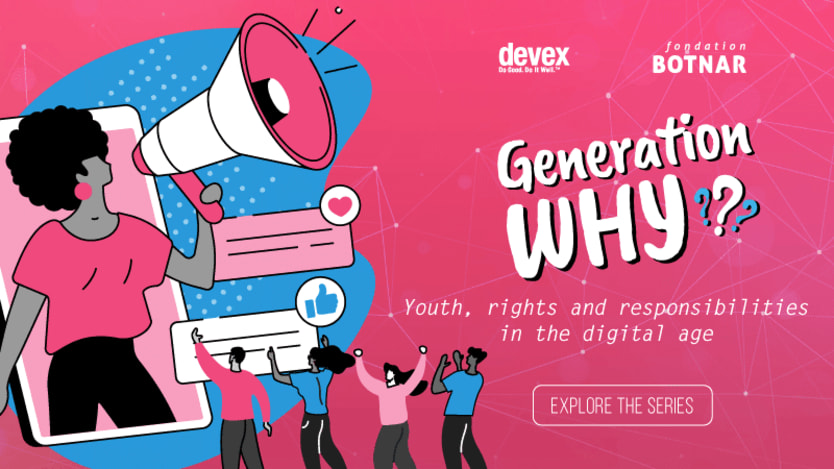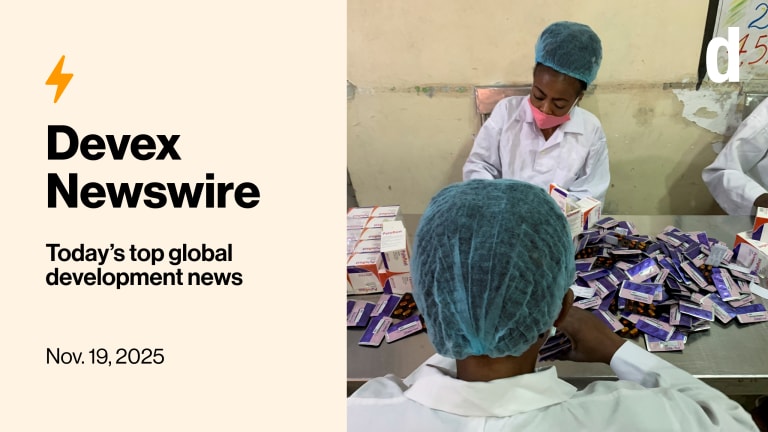Q&A: Digital rights a life-or-death issue for Nigeria's LGBTQ activists

While online privacy and data ownership are often associated with an unwillingness to share information with big tech companies profiting from it, violations of digital rights can have potentially deadly consequences for activists in some countries.
According to a 2021 report produced by the African Digital Rights Network, state surveillance is becoming a growing threat in Africa and existing laws have largely failed to stop state surveillance across the continent.
“I keep fighting and creating as much visibility as I can for myself … so if the government comes for you, you don't just disappear; your digital footprint is there.”
— Matthew (Blaise) Nwozaku, LGBTQ activist in NigeriaThe risk of “digital authoritarianism” — including internet control, surveillance, and censorship — is on the rise in Africa, as is the number of internet shutdowns. Nigeria, for example, has just ended a seven-month ban on Twitter after the platform deleted a post by the country’s president that some interpreted as threatening genocide.
“Privacy is a matter of life and death for some people,” said LGBTQ activist Matthew (Blaise) Nwozaku. “In Nigeria, there is a social media bill aimed at regulating social media, but it's important for us that we are not being punished for speaking the truth. We can’t give the government the power to regulate what we say and what we see [online].”
Devex spoke with Nwozaku — who is openly gay and lives in Nigeria, where same-sex marriage and relationships are illegal — about the power of social media to change minds and challenge homophobia, as well as the importance of ensuring freedom of expression and safe online spaces.
The conversation has been edited for length and clarity.
In what ways are digital platforms simultaneously supporting freedom of expression — by expanding access to information and connecting people — and acting as a channel for hate speech?
The internet is very helpful for countries like Nigeria, where we have a lot of human rights violations and leaders trying to shut people up. It has been instrumental in reaching the global community and for holding people accountable.
For me as an LGBTQ activist, I would not be able to do the work that I do without the internet, because it entails reaching out to young people and helping them through their queer journeys. The internet is a platform where I’m able to do this, because in Nigeria we have very homophobic laws that make it difficult for people to fully be and express themselves.
Imagine a world without the internet: We would be all in our homes, in our closet, unable to access [this online LGBTQ] community. It's instrumental for building community and helping people in trouble. In Nigeria, gay people have often been in trouble. They've been set up by homophobes [online to meet in person] that want to kill them. But after someone receives a threat online, people come to their rescue, so the internet has saved many lives — including my own — on many occasions.
As with most things in life, we have the positive and we have the bad. The internet is a place where you find all sorts of homophobia, and the government can easily track people and their movements. So for me and my work, it's very scary. Sometimes I think the government will track me and come for me — and when I'm gone, no one will talk about me anymore because they have a way of shutting people up.
The internet has put me in situations where I felt very helpless, and it wasn’t good for my own mental health and physical safety. It's crazy what young people, especially those who are fighting for change, face on the internet. The trolls that we face — people lie about us and our work. … You meet all kinds of people who are against your work.
So in as much as it does something very good — it amplifies voices, it builds both international and interregional solidarity, it gives us support — it also exposes us to both physical and mental danger.
What do you and your fellow activists say to the idea that human rights should apply both online and offline, and that governments and companies alike should be protecting them?
The law, and the constitution, states that every person is equal and should enjoy their [human] rights. But in Nigeria, being queer or gay makes you a criminal, and so you are no longer regarded as people. There's this dehumanization of your complete being.
So I keep fighting and creating as much visibility as I can for myself. By doing so, I also build visibility for the LGBTQ community in Nigeria. So if the government comes for you, you don't just disappear; your digital footprint is there, and there's also the evidence of the work you've done and your movement online.
For activists like me, it's very important that a lot of people know about our work and know about us so that if we are harmed, it brings global attention to the issue. Our government does not want to protect us because we are queer, so it's very important that we get this protection from the international community. When we stop fighting, it's our death.
In what ways do you use social media as a platform to advocate for LGBTQ rights in Nigeria and globally?
I use social media to educate people about current issues in Africa, especially when it comes to LGBTQ experiences. For instance, I made an infographic on Instagram about queer issues in Africa and it got 500,000 views; people read it and were sharing it. I discovered that I have this social capital that I should not just let go of, so I use it to help people as much as I can by fundraising for them and by being that emergency support they can go to.
“Imagine a world without the internet: We would be all in our homes, in our closet, unable to access [this online LGBTQ] community.”
—Some time ago, a trans woman was drugged by her boyfriend and she called me [for help]. I did not have money at hand, but I knew that if I made a post on social media, I could get money and help her. So I was able to get some money and provide her with temporary shelter. And just last week, I was able to fundraise some money for a trans shelter in [the capital city of] Abuja.
Social media has been very helpful for fundraising, even though it's exhausting too. Sometimes I get so overwhelmed [that] I just start crying because the [burden] … is too much for me. But when I see people happy, when I see their problems solved, it gives me so much joy and I feel accomplished. It is not just the awards and the recognition I've received, but the impact I’ve made on people's lives. And if they are able to help others because I have helped them, that is what accomplishment means to me.
The Same Sex Marriage (Prohibition) Act in Nigeria bans same-sex marriage and relationships. How can online movements such as #EndHomophobiaInNigeria help tackle homophobia and stigma and ultimately advance LGBTQ rights?
The campaign was a very significant part of our queer history here in Nigeria. The night before it started, there was news of a gay person that was killed here in Nigeria. There was so much silence around his killing, but when it comes to heterosexual people in the same situation, everybody talks about them.
So I made the initial [social media] video where the killers confess they killed him because he was gay. At that point, the story was going viral, and the comments were unbelievable. People were justifying the homophobic killing, and the anger actually led one of my friends to say: "You know what? We can be tweeting with this hashtag." And I took it up and started tweeting. It seemed like everybody was tweeting with the same hashtag. And before we knew it, it was trending as No. 1 in the Nigerian Twitter space, and everybody was talking about it.
That moment was a point of education for a lot of people who did not really know our queer struggles. People started to speak up about their own experiences. When you share [these] stories, they are able to change people’s minds, change their perspectives. #EndHomophobiaInNigeria really did change perceptions of people about LGBTQ people. And even if it was a dark moment, it was still an opportunity to educate people.
At the end of last year, sensitive information and photos were leaked after an Israeli LGBTQ dating site got hacked. Why is it important to protect the privacy of the LGBTQ community?
People don't really know the real-life consequences of this information being out there for other people in countries where they are criminalized. One step is to really have people with these experiences at the decision-making table — to always echo the fact that people are being killed every day for being gay. This little space that we have where we can just express ourselves and be ourselves is our own safe space. When anything goes wrong, it puts our lives, it puts our jobs, it puts everything about us in danger.
Privacy is a matter of life and death for some people. In Nigeria, there is a social media bill aimed at regulating social media, but it's important for us that we are not being punished for speaking the truth. We can’t give the government the power to regulate what we say and what we see [online]. We have to make it as decentralized as possible, knowing that nobody has the absolute power to control what we say.
But if someone is putting the lives of others at risk, it's very important that people are held accountable. We need a system where people can be held accountable for being homophobic, for being misogynistic, for being transphobic. That’s very important.
Visit the Generation Why series for more coverage on how we can ensure the digital space advances the rights of all young people and leaves no one behind. You can join the conversation using the hashtags #DevexSeries on #DigitalRights.

Search for articles
Most Read
- 1
- 2
- 3
- 4
- 5








